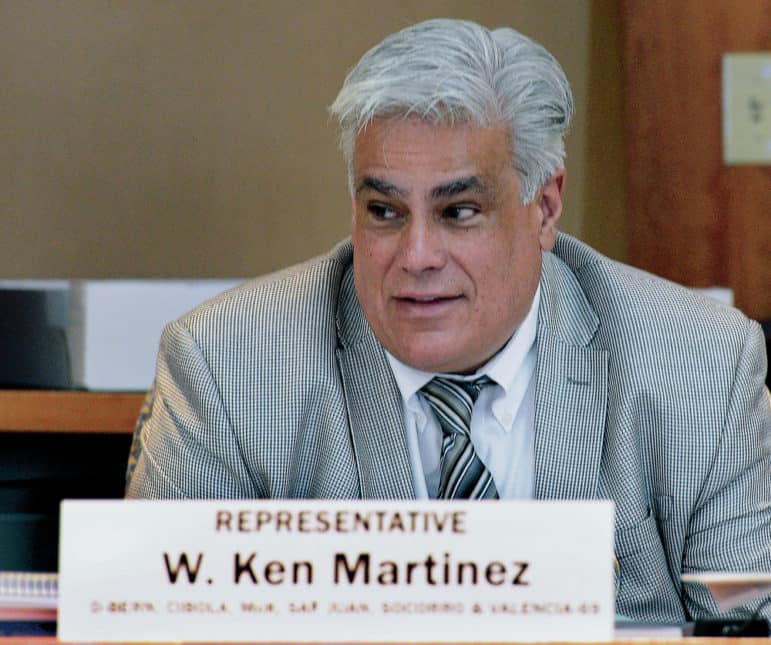
Clyde Mueller / The New Mexican
Rep. Ken Martinez, D-Grants, asks questions about HJR 10 during a committee meeting Monday. He voted for the legislation, but it died on a 6-5, party-line vote.
One bill to use gains from the state’s $15 billion land grant endowment to expand early childhood education in New Mexico died Monday.
A second proposal survived the day, but it has little chance of clearing the Legislature and receiving a place on the November ballot.
In a 6-5, party-line vote, members of the House Government, Elections and Indian Affairs Committee defeated a bill to annually use seven-tenths of 1 percent of the endowment for early childhood education. Majority Republicans on the committee voted against the measure.
The other bill, which would allocate 1 percent of the endowment each year for early childhood programs, cleared the Senate Rules Committee in another 6-5, party-line vote. This time it was Democrats in the majority, and they moved their bill ahead.
Even so, the Senate version of the bill appears doomed. It’s a more expensive proposal than the companion proposal that House Republicans rejected, and a constitutional amendment must receive approval from both chambers of the Legislature to make the ballot.
Advocates of early childhood programs, designed to help infants and children through age 5, testified before both committees. They said New Mexico is last or near the bottom on lists tracking poverty, child well-being and employment.
“These are votes for the poorest children in the United States of America,” said Allen Sánchez, executive director of the New Mexico Conference of Catholic Bishops.
Javier Benavidez, executive director of the Southwest Organizing Project, said investing more in early childhood education would turn around lives and lead to savings later. “We spend three times more on prisons than we do on early childhood education,” he said.
State Land Commissioner Aubrey Dunn, a Republican, opposed the bills. He said the land grant endowment must last for “my three granddaughters, their children and their children.”
Dunn said legislators are supposed to represent the people, and they know the issue of money management better than the public, so he doesn’t want the proposals to go on the ballot.
Sen. Sander Rue, R-Albuquerque, said he was satisfied that scientific evidence shows that early childhood education is effective. But, Rue said, he has concerns about taking money from the endowment and then making sure it would be spent properly.
“Where’s the oversight?” Rue asked before voting against the proposal. He also questioned how the enabling legislation for the constitutional amendment would be composed if voters approved it. “I really don’t trust us as a Legislature to work that out later,” Rue said.
Sen. Mark Moores, R-Albuquerque, his voice rising in anger, questioned the process for debating an amended version of the Senate bill. Then Moores talked over Rules Committee Chairwoman Linda Lopez, D-Albuquerque, after she told him he had spoken out of turn to the bill sponsor.
Moores said legislators had increased funding for early childhood programs by “a quarter of a billion dollars,” and that money from the general fund spends just as well “raiding” the endowment would.
Sen. Michael Padilla, sponsor of the Senate bill, replied that his proposal would not “raid” the fund. Padilla said the endowment has continued to grow, and would not be threatened by a 10-year program to reverse the state’s ills by investing in the smallest children.
Moreover, Padilla said the lion’s share of the money Moore talked about did not go to early childhood education, but to elementary schools.
Though Democrats are the majority party in the Senate, Padilla’s bill may not make it through that chamber, much less the Republican-controlled House of Representatives. The Senate Finance Committee, led by Chairman John Arthur Smith, D-Deming, has opposed spending money from the endowment for another program.
The land grant endowment already helps pay for K-12 public schools. It provided more than $655 million for the school system during this budget year.
Contact Milan Simonich at 986-3080 or msimonich@sfnewmexican.com. Follow his Ringside Seat column at santafenewmexican.com.